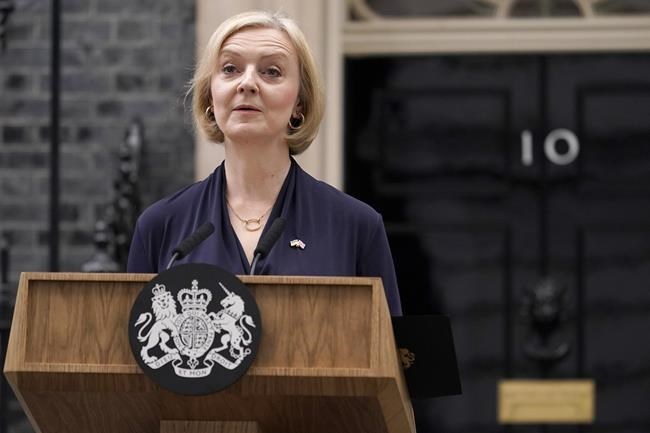OTTAWA — More political tumult in Britain is likely to further stall trade talks with Canada, experts say — but Canada's high commissioner in London is more optimistic.
British Prime Minister Liz Truss quit Thursday after a tumultuous 45 days in office marred by economic policies that roiled financial markets and a rebellion in her political party that obliterated her authority.
Truss became the third Conservative prime minister to be toppled in as many years, extending the instability that has shaken Britain since it broke off from the European Union.
Ralph Goodale, Canada's envoy to the United Kingdom, says that he believes the relationship will carry on "largely unaffected."
"There may be some meetings that get postponed from this month to next month or a minister may change here or there," he said. "But the kinds of issues that are so critically important to both of our countries really transcend political differences."
That includes a pending trade agreement. "I don't sense any delay whatsoever," he said. "Both countries at the highest levels are totally committed to this. The process is well advanced."
Still, Canadian trade experts fear getting another cabinet in place could delay the trade talks.
"If there is a new leader in place and new cabinet ministers in place, it takes time for them to get up to speed on their files," said Trevin Stratton, a senior economic adviser at Deloitte Canada.
"Any agreements that are being negotiated, they might be put on hold for a little while until there is new leadership," said Stratton, who advised the Canadian Chamber of Commerce on how Canadian businesses could benefit from Brexit.
Since Brexit, the U.K. has been focused on deepening ties with countries outside Europe, especially Commonwealth peers such as Canada.
A continuity agreement is currently in place that keeps most of the former European Union rules in place until Canada signs a new trade deal with Britain.
Lawrence Herman, a Toronto trade lawyer, argues that the tumult could put that out of reach in the near future.
"The political turmoil in the U.K. will inevitably spill over into the bilateral relationship, slowing down advances in many policy areas, including international trade," he wrote in an email from Britain, where he is travelling on business.
"While the basic commercial relationship will continue, there won’t be any progress in negotiations of a new trade agreement for some time, at least until the U.K. political situation is stabilized."
Goodale said three negotiating sessions on a new deal have already taken place and a fourth, scheduled for late November or early December, should proceed as planned.
While some high-level issues may be postponed "until the nature of the U.K. cabinet is settled," the agenda for that session is already established and the political direction was already given to negotiators.¬Ý
"I don't anticipate any appreciable hiccup in the process," he said.
Finalizing the details of a new trade agreement may take some time as Britain's priorities shift amid a cost-of-living crisis and looming recession.
The low-regulation economic policies that got Truss elected by her party, particularly an unfunded tax cut, proved disastrous in the real world at a time of soaring inflation and weak growth.
Stratton noted that those policies put the British pound in free fall, with the Canadian dollar making gains on the sterling that could lead to a decline in exports to the U.K.
He said Truss's resignation could bring currency rates back to normal, while her party has had a fairly consistent desire to ink new trade deals.
"This resignation itself won’t necessarily have a huge impact on our trading relationship, considering the long-standing economic ties there," Stratton argued.
The British Canadian Chamber of Trade and Commerce said those ties have come to the forefront, now that it's just as easy to export to Canada as it is to export to Europe.
"Brexit, by making it a lot harder to do business with Europe, has been a levelling of the playing field," said Martin Buckle, the Toronto group's treasurer.
"Canada has such a positive image in the U.K. that people do look here as the next step on a global expansion."
Buckle said he hopes the dysfunction in Britain doesn't hamper intelligence and military ties, but he expects Canada's trade talks to move smoothly once the rancour in London abates.
"The civil servants working on it have been getting quite a lot of practice since Brexit, so they're pretty smart people."
The Conservatives say they plan to install a new leader by the end of next week. They hold a majority in the Commons, though the opposition Labour Party is calling for an election.
It has been a chaotic week in Parliament, with party whips accused of using heavy-handed tactics to gather votes.
Chris Bryant, a Labour lawmaker, said Wednesday that he "saw members being physically manhandled … and being bullied." Conservative officials denied this.
Newspapers that usually support the Conservatives have been vitriolic. An editorial in the Daily Mail on Thursday was headlined: "The wheels have come off the Tory clown car."
Truss's departure on Thursday sparked jubilation for the tabloid Daily Star, which had set up a livestream last week featuring a photo of the prime minister beside a head of lettuce to see which would last longer.
"This lettuce outlasted Liz Truss!" it proclaimed Thursday.
While many Britons joined the world in laughing at the lettuce joke, Bronwyn Maddox, director of international affairs think-tank Chatham House, said, "there is no question that the U.K.'s standing in the world has been severely battered by this episode and by the revolving door of prime ministers."
She said Truss's successor would need to have policies "based on economic stability, but need also to include a resolution of the relationship with Europe; much of the upheaval represents the bitter aftermath of Brexit."
This report by The Canadian Press was first published Oct. 20, 2022.
— With files from Marie-Danielle Smith and The Associated Press.
Dylan Robertson, The Canadian Press




